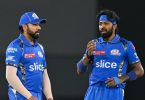The children drummed away on their palms with one, two, three, and then five fingers, the crescendo of their applause rising like the music of thickening summer rain.
“You hear that noise?” asked Kumar Sangakkara, the conductor of this impromptu orchestra. “That is the noise of what Sri Lanka sounds like when we all work together.”
Sangakkara’s main claim to fame, of course, is not his gift for the musical arts — unless you count the percussion of his cricket bat against balls destined for stern and spectacular banishment.
His speech came at a school athletics championship earlier this year. Now, as Sri Lanka reels from a series of blasts that killed hundreds and underscored its political troubles, clips of the cricket icon’s call for harmony are being shared again.
“Sri Lanka has many moving parts,” the former Lankan captain said, referring to the island nation’s diversity, before leading a simple demonstration of the power of many.
When the applause subsided, the children, who were dressed in tracksuits or band uniforms, listened to him conclude his speech.
“Forget what people before you have done,” Sangakkara said. “Just make sure that when you have the opportunity to address a generation that follows, that you have ensured that Sri Lanka, all of Sri Lanka combined together, celebrates as one.”
Over 350 people have been killed in Sri Lanka by blasts that targeted its Christian minority and hotel guests on Easter Sunday. The attacks shattered the relative calm that prevailed after the end of its civil war; they were blamed on two local Islamist groups and later claimed by the Islamic State group.
“While we struggle to comprehend the depths of depravity people can descend to, and while we all grieve in unison, we need to find the strength to stand together as Sri Lankans; shoulder to shoulder and heart to heart,” Kumar Sangakkara wrote on Instagram after the attacks.
“Together we can get through. Divided we have but little hope.”






